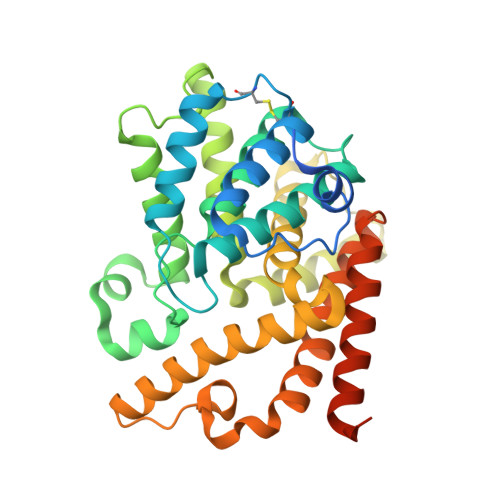Design, Optimization, and Biological Evaluation of Novel Keto-Benzimidazoles as Potent and Selective Inhibitors of Phosphodiesterase 10A (PDE10A).
Hu, E., Kunz, R.K., Chen, N., Rumfelt, S., Siegmund, A., Andrews, K., Chmait, S., Zhao, S., Davis, C., Chen, H., Lester-Zeiner, D., Ma, J., Biorn, C., Shi, J., Porter, A., Treanor, J., Allen, J.R.(2013) J Med Chem 56: 8781-8792
- PubMed: 24102193
- DOI: https://doi.org/10.1021/jm401234w
- Primary Citation of Related Structures:
4MUW, 4MVH - PubMed Abstract:
Our development of PDE10A inhibitors began with an HTS screening hit (1) that exhibited both high p-glycoprotein (P-gp) efflux ratios in rat and human and poor metabolic stability. On the basis of cocrystal structure of 1 in human PDE10A enzyme, we designed a novel keto-benzimidazole 26 with comparable PDE10A potency devoid of efflux liabilities. On target in vivo coverage of PDE10A in rat brain was assessed using our previously reported LC-MS/MS receptor occupancy (RO) technology. Compound 26 achieved 55% RO of PDE10A at 30 mg/kg po and covered PDE10A receptors in rat brain in a dose-dependent manner. Cocrystal structure of 26 in PDE10A confirmed the binding mode of the novel scaffold. Further optimization resulted in the identification of keto-benzimidazole 34, which showed an increased in vivo efficacy of 57% RO in rats at 10 mg/kg po and an improved in vivo rat clearance and oral bioavailability.
- Department of Medicinal Chemistry, ‡Department of Molecular Structure, §Department of Pharmacokinetics and Drug Metabolism, ∥Department of Neuroscience, Amgen Inc. , One Amgen Center Drive, Thousand Oaks, California 91320-1799, United States.
Organizational Affiliation:



















